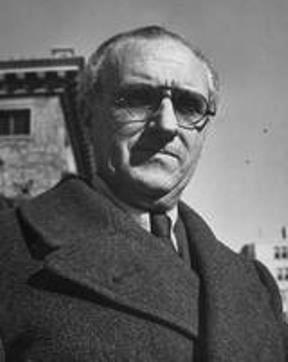Italian Ambassador to the United States

https://it.wikipedia.org/wiki/File:Alberto_Tarchiani.jpg
1885-1964
Rome; Washington DC
Alberto Tarchiani was a Republican politician, fervent anti-fascist and important Italian diplomat, who served as Italian ambassador to the United States in the years immediately after the war, in a period when the emergence of the Cold War and the popularity of the Communist Party in the peninsula made the alliance with Italy of strategic importance for the US government.
Alberto Tarchiani was born in Rome, on November 11, 1885. At 18 years old, he started to work as a journalist and editor for the Nuovo Giornale in Firenze. In 1907 he moved to the United States, where he worked as a foreign correspondent, while directing the weekly Italian-language newspaper Il cittadino, printed and distributed in the city of New York. Here he met his first wife, Teresa Minetti, and became familiar with American society and institutions. He then returned to Italy to enlist as a volunteer during the First World War, embracing the interventionist cause.
In 1919, Tarchiani began working at Il Corriere della Sera, becoming editor-in-chief the following year, thanks to his association with Luigi Albertini. Following, however, the expulsion of the latter from the newspaper (due to his anti-fascist activity) Tarchiani himself left Il Corriere in 1925, choosing to expatriate to France and joining the group of anti-fascists organized in Paris by Gaetano Salvemini.
In 1929, Tarchiani was, together with Gioacchino Dolci, among the main organizers of the escape from confinement of Carlo Rosselli, Emilio Lussu and Francesco Nitti. Shortly after, he participated in the creation of the political movement "Giustizia e Libertà." He would later author many articles on international politics published in the magazine of the movement, the Quaderni di Giustizia e Libertà.
During the 1930s, he took part in several anti-fascist initiatives. He, however, left the group of "Giustizia e Libertà" following the murder of the Rosselli brothers, in 1937. That same year he founded, together with Rodolfo Piacciardi, the political weekly La Giovine Italia, characterized by a clearly republican and Mazzinian political orientation.
In the summer of 1940, following the Nazi occupation of France, Tarchiani went back to the United States. Together with Carlo Sforza and Max Ascolihere, he was among the main promoter of the anti-fascist and pro-American "Mazzini Society," soon becoming secretary of the organization.
During this second period in New York, Tarchiani also wrote articles for the magazine Mazzini news. The main goal of the movement was to propose to the U.S. government an interlocutor capable of being a point of reference and to carry out capillary anti-fascist propaganda among the Italian-American community. The relations established as secretary of the "Mazzini Society" with some members of the U.S. government would prove to be very important during his years as ambassador.
In 1943, Tarchiani returned to Italy, where in 1944 he participated in the Allied landing at Anzio. He then joined the Partito d'Azione, leaning towards the party's liberal-democratic wing. As a representative of the party, Tarchiani was appointed Minister of Public Works in the second Badoglio government (April-June 1944).
Because he was considered an expert connoisseur of American society, in the autumn of 1944 his name began to circulate as a possible Italian representative in Washington. His candidacy was sponsored, in particular, by Carlo Sforza. He was officially appointed ambassador in February 1945, during the second Bonomi government, in which De Gasperi was Minister of Foreign Affairs.
Tarchiani's experience and knowledge of the US institutional and administrative mechanisms enabled him to play a leading role, not only working alongside but also supporting De Gasperi, with whom he immediately established a relationship of mutual respect.
Tarchiani's mandate as ambassador lasted ten years, from 1945 to 1955, covering a decade of great importance, during which Italy's relations with the United States were as central as they were complex given the general context created by the Cold War.
The first problem faced by Tarchiani as ambassador was the need to ensure that Italy received material and financial aid from the United States. Tarchiani was able to leverage his network of personal and diplomatic relations to improve Italy's image and political legitimacy abroad, thereby facilitating the work of the Italian missions sent to Washington in those years and effectively working to overcome Italy's status of former enemy country, as well as American mistrust towards Italy.
In 1947, Tarchiani played a particularly important role in De Gasperi's trip to Washington, facilitating his meeting with President Harry Truman, as well as with several members of the Italian-American community.
A fervent pro-American, Tarchiani always remained convinced that a close relationship with the United States was essential. His mandate ended in 1955, together with the end of "De Gaperi's era."
Upon his return from America, Tarchiani retired from the political scene, dedicating himself to writing essays and memoirs.
He died in Rome on November 30, 1964.
Related Vectors
Alcide De Gasperi
Italian Democratic Christian politician and prime minister
Clare Boothe Luce
US ambassador to Italy
Max Ascoli
"Letters from her excellency ambassador Luce and his excellency ambassador Tarchiani"
Interiors, 4/1954
Sources
Tarchiani, Alberto. Il mio diario di Anzio. Milano: Mondadori, 1947.
Roma, Ministero degli Affari esteri, Archivio storico diplomatico, Fondo Ambasciata d’Italia in Washington (1947-57) e Segreteria De Gasperi (1944-46, 1951-53). I documenti diplomatici italiani, 10ª serie: 1943-1948, I-VII, Roma 1992-2000, e 11ª serie: 1948-1953, I-VI, Roma 2005-2015, ad indicem.
Tirabassi, Maddalena. "La Mazzini Society (1940-1946). Un’associazione degli antifascisti italiani negli Stati Uniti," in Migone, Gian Giacomo, Giorgio Spini e Massimo Teodori (eds.), Italia e America dalla grande guerra ad oggi, Padova: Marsilio, 1976, pp. 141-158.


